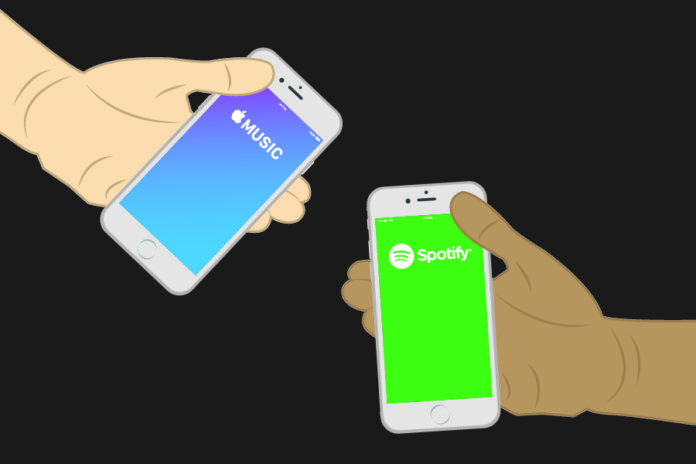Streaming is the biggest threat to stars like Selena Gomez and Justin Bieber
Before streaming, buying iTunes gift cards occupied the top of my Christmas list. I spent hours deciding which songs I wanted to buy. Would I spend my last $1.29 on an old favorite or the newest chart-topper?
When I was a freshman in high school, I was introduced to Spotify, a certifiable game changer. My playlists were embellished with descriptions and covers, often spanning hours. That was in 2015 amid Spotify’s rise into streaming royalty, so I was pretty late to the game.
Buying music is an obsolete practice nowadays. The relatively small fee for Apple Music or Spotify Premium has proven to be worth the endless collection of music, podcasts and radio options. In lieu of these changing times, music has changed monumentally in recent years. Chart-topping tracks now become viral TikTok hits as opposed to radio frequents.
And so, in the classic fashion of celebrities impounding any sort of cultural phenomenon for their own personal gain, the practice of begging for streams began.
I don’t blame artists, honestly. If most music consumers are listening through streaming platforms, it’s entirely logical for artists to appeal to their audience through this method.
Take BTS, for example. I’d say they’re the most successful boy band in the world at the moment. The group is a lethal combination of excellent choreography and intoxicating vocals that have earned them high praise across the board.
One of BTS’s most defining aspects, however, is not musical. Their fandom, known as “the Army” (a nod to the band’s Korean name, Bulletproof Boyscouts) is an essential part of the band’s identity. The Army’s upstanding goal? Support the band by all means necessary. This includes devoted streaming of music videos and new music releases in efforts to increase the band’s numbers.
Reddit threads are dedicated to smart streaming practices, including bypassing YouTube’s view removal algorithms and efforts to maximize your streaming even while you sleep.
From an outsider’s perspective, this can seem like a typical boy band obsession. In reality, streaming culture has skyrocketed BTS’s success. Streaming services account for 80% of music revenue today, according to the Recording Industry Association of America. This is reflective of BTS Army’s practices.
The rise of streaming has not only shaped how we listen to music but also how we discover music.
Roddy Ricch, a more recent viral success, found commercial success with “The Box,” characterized by an infectious creaking sound that spawned thousands of TikTok videos and later topped the Billboard Hot 100 chart for 15 weeks.
The song’s success has been a win for the entire music community. Ricch has been cited as a “new pop star,” as his rap hit outshined Bieber’s “Yummy” and Selena Gomez’s “Rare.”
Then, things began to get messy. Justin Bieber, noticing his success wasn’t as immediate as it usually was, reached out to his aged fanbase, pleading them to stream his barely mediocre single. In a now-deleted Instagram post, Bieber encouraged fans to create playlists of “Yummy” and to play it at a low volume while they sleep. The post also encouraged iTunes users to buy the song multiple times.
Bieber’s post was vile. BTS’s streaming efforts are similarly militant, but they are promoted by the fanbase themselves. Sure, BTS will occasionally call on their fans to stream their music, but no artist actually asks the fans to go to the extreme lengths that they end up doing anyway.
What was even more distressing was that Selena Gomez actually followed suit in begging her fans to stream her new album. Via Instagram story, Gomez asked her fans to stream the album, acknowledging that “Rare” was close behind Ricch’s album “Please Excuse Me For Being Antisocial.”
The plaguing of Ricch’s commercial success with these desperate calls by industry giants is a complete disservice to the music community.
Justin Bieber and Selena Gomez grew up in the limelight. Their music had a time and place (namely, mid-2010). Unlike Gomez, Bieber has been producing a steady stream of content for years through albums or features on various projects. These industry giants shouldn’t have to beg us for money and appreciation, especially when they’ve received it their entire lives. As artists, they should primarily be focused on creating music that satisfies them.
If your music doesn’t attain commercial success, whether through streams or charts, then it is out of your hands. It’s over the line when it directly impedes charting newcomers who are changing the course of music history and paving the way for other new artists.
Written by: Isabella Chuecos –– ifchuecos@ucdavis.edu
Disclaimer: The views and opinions expressed by individual columnists belong to the columnists alone and do not necessarily indicate the views and opinions held by The California Aggie




